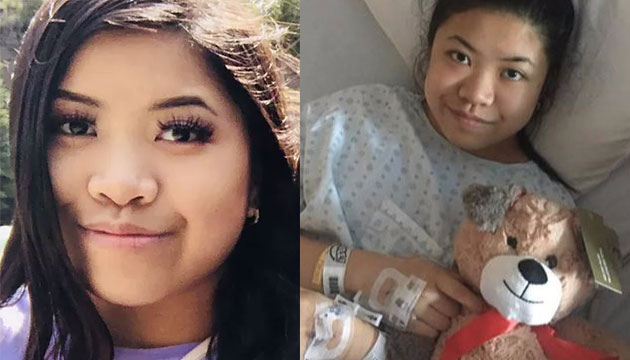Roshlind Kate Mance was looking forward to a lot of things this year.
Born in Winnipeg to Filipino parents, Mance was turning sweet 16. She was also set to start Grade 11 in Calgary, where the family moved to in 2017.
However, her life and that of her loved ones changed forever when she was rushed to the hospital on July 11, 2018. She was feeling intense pain from the legs up, and her body had bruises the size of baseballs.
Mance was diagnosed with aplastic anemia, a rare and serious disease that occurs when the bone marrow fails to produce enough blood cells.
Aplastic anemia leaves sufferers feeling fatigued. They are also vulnerable to a higher risk of infections, and uncontrolled bleeding.
In the days that followed, Mance was diagnosed with a second condition called paroxysmal nocturnal hemoglobinuria or PNH.
A rare and life-threatening disease of the blood, PNH is characterized by the destruction of red blood cells, blood clots, and impaired bone marrow function, which results in the insufficient production of important blood components.
Mance’s best chance of survival is a bone marrow transplant.
Siblings are the best sources for a match for bone marrow. However, neither of her sisters Adrienne and Kirsten is a match. Parents Benny and Jophine are also not a match. This means that Mance’s life now depends on a stranger.
In a YouTube video, Mance said that she feels “overwhelmed”. She also said that because of her condition, her activities have become very limited.
The odds of finding a matching donor are challenging.
A website dedicated to Mance notes that only one percent in the database of potential donors for bone marrow and stem cells, which are found in bone marrow, are of Filipino ancestry.
According to the site https://www.match4roshlind.com/, there is also a relatively low number of Asians registered to become donors.
The underrepresentation of ethnic minorities in the donor registry has caught the attention of Alberta politicians.
Calgary Mayor Naheed Nenshi is featured in a YouTube video asking people aged 17-35 to register with the OneMatch database of the Canadian Blood Services (CBS).
The CBS, which is a creation of the federal, provincial and territorial governments, has been encouraging stem cell donations for many years.
Stem cells are produced by the bone marrow and are used to treat more than 80 blood-related diseases and disorders, according to the CBS.
In addition to bone marrow, stem cells can also be derived from a person’s blood.
Stephen Mandel, leader of the provincial Alberta Party, said in a separate YouTube video that the underrepresentation of ethnic communities makes it difficult for visible minority patients with health conditions requiring bone marrow and stem cell transplants to find a donor.
The Leukemia/Bone Marrow Transplant Program of British Columbia, which is run by medical doctors at the Vancouver General Hospital, provides additional explanation about the science regarding bone marrow and stem cell transplants.
“Blood cells grow in the same way as other human cells,” according to the program. “They develop in the bone marrow from a parent cell known as a stem cell. Stem cells are immature cells that can develop into all of the different types of blood cells: white blood cells, red blood cells and platelets. Stem cells are usually found inside the bone marrow spaces of large bones. They can also travel from one bone to another by way of the blood stream.”
Mance’s family and supporters are holding two events to find potential bone marrow and stem cell donors on November 3 and November 4 in Winnipeg at the Cindy Klassen Recreation Complex (999 Sargent Avenue).
The Canadian Blood Services continues to promote the expansion of its OneMatch registry.
For more details about Mance, see https://www.match4roshlind.com/


